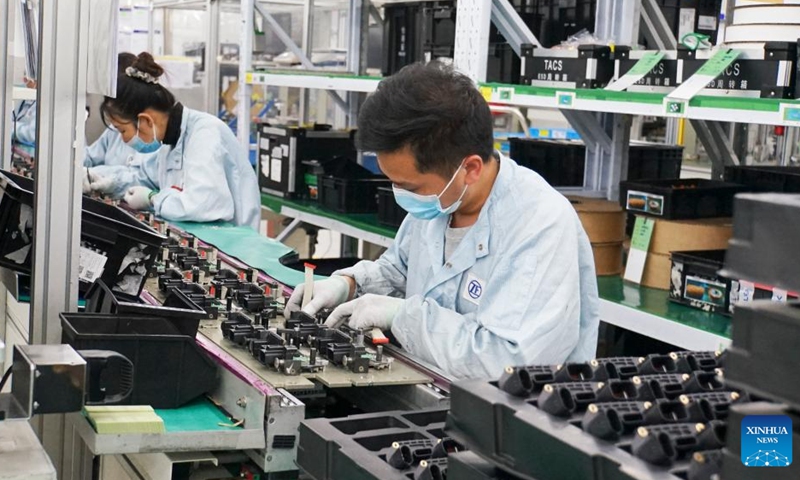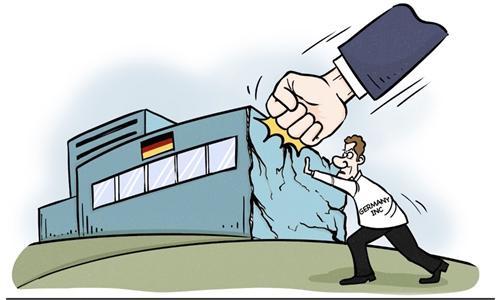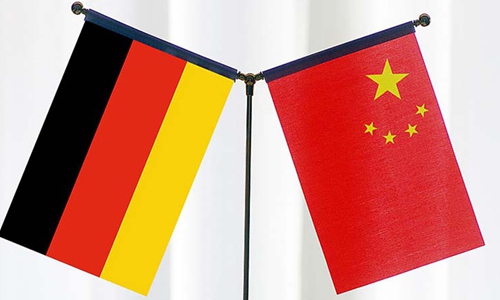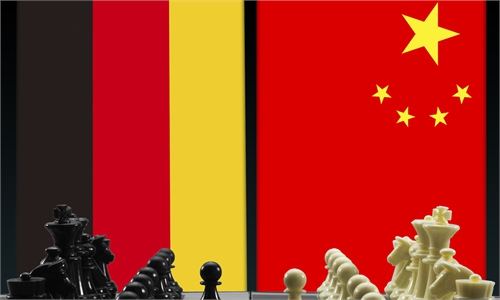German economic minister hypes cutting reliance on China, while Beijing calls for building more bridges than walls
World needs more bridges, roads than high walls: official

Employees of an auto parts company work at a workshop in Anting Town of Jiading District, east China's Shanghai, March 26, 2022. Photo:Xinhua
German politicians have been intensifying hype over "reducing dependency on China" lately, and the country's economy minister said on Tuesday that the ministry is working on a new trade policy related to China.
Experts said on Wednesday that Germany - troubled by a deepening energy crisis after Russia slashed supplies amid sweeping sanctions by the West - is getting jittery that Chinese supplies may be disrupted if tensions between China and the US keep escalating.
They urged German and European politicians to drop nationalism and anti-globalization mentality to pursue policy independence in the middle of a major power contest, and continue normal economic and trade cooperation with China for the good of Europe's own well-being.
The comments came as German Economy Minister Robert Habeck said that Berlin has been working on a new trade policy related to China to reduce dependence on Chinese raw materials, batteries and semiconductors, Reuters reported on Tuesday.
"We cannot allow ourselves to be blackmailed," Habeck was quoted as saying. He indicated that the new policy would include closer examination of Chinese investments in Europe, such as infrastructure, Reuters reported.
"Despite the repeated rhetoric, no turning point can be seen in the China-Germany economic and trade relationship yet," Cui Hongjian, director of the Department of European Studies at the China Institute of International Studies, told the Global Times on Wednesday.
"As Germany has drawn rising criticism in the West over its dependence on Russian oil and gas, it wants to shift away from China to avoid more potential criticism in the future… Unlike the US, which seeks 'decoupling' from China for its national interests, Germany is unlikely to make laws and regulations to impose economic restrictions on China," Cui said.
He said Germany may conduct some industrial diversification, but it will not cut off economic ties with China for its own benefit.
"Large German companies which have made hefty profits in the Chinese market will stay in China, for example, Volkswagen and Mercedes-Benz," he said.
However, Zhao Junjie, a research fellow at the Chinese Academy of Social Sciences' Institute of European Studies, warned of an apparent change in the political ecosystem in Europe, saying that the growth of nationalism and anti-globalization trend may disrupt China-Germany cooperation in important sectors such as auto-making and chemicals.
Germany has been a clear winner from globalization and has greatly benefited from the growth of China, especially during the global and European financial crises. However, neglecting such facts, German Chancellor Olaf Scholz's center-left government pursues a "value-based" foreign policy and continues to politicize economic issues, according to Zhao.
For instance, Germany's Economy Ministry announced in May that it will stop all investment guarantees for companies looking to invest in China's Xinjiang, citing so-called "human rights" issues in the region, Politico reported.
Lately, German economic and foreign ministries reportedly want to veto Chinese company COSCO's acquisition of a 35-percent stake in the Tollerort container terminal in the country.
Although some German politicians are hyping concerns about the close China-Germany economic and trade relationship, many German multinationals continue to expand their presence in China for pursue more growth opportunities.
On September 6, German chemical giant BASF's Verbund site in Zhanjiang, Guangdong Province entered full-scale construction phase. With a total investment of about 10 billion euros ($9.93 billion), the plant will be the third-largest BASF site in the world, and the largest single investment project by a German enterprise in China, the Xinhua News Agency reported.
Stefan Wolf, president of Gesamtmetall, the federation of German employers' associations in the metal and electrical engineering industries, said that it is almost impossible for Germany to reduce its "economic dependence" on China in the short term, and it would "paralyze German industries," if the nation launched an "economic war" with China, according to an RFI report in Chinese.
Germany would face costs almost six times as much as Brexit if the country chooses to decouple from China, according to a report by the ifo Institute, a Munich-based research institution.
Despite the protracted COVID-19 pandemic and rising geopolitical tensions around the world, bilateral trade between China and Germany rose 2 percent year-on-year in the first eight months this year to $155 billion, data from the Chinese customs showed.
Marking an important milestone for China's cooperation with Hamburg, Germany and Europe, the 10,000th fully loaded China-Europe freight train of 2022 arrived in Hamburg on Friday.
"Amid complex and volatile international situations, the world needs more bridges and roads rather than more walls. China and the EU should join hands for development and prosperity, and promote international cooperation and human progress," Chinese Foreign Ministry spokesperson Mao Ning said on Wednesday.



